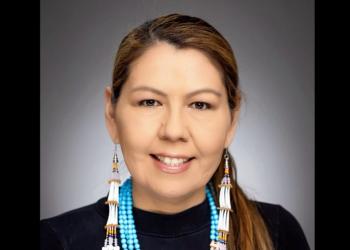Image Caption
Local Journalism Initiative Reporter
Windspeaker.com
The host society for the next North American Indigenous Games (NAIG) has named its CEO.
Lowa Beebe, who is a leading advocate, strategist and advisor in Indigenous governance, public relations and cultural awareness, was chosen to spearhead the 2027 NAIG, which will for the most part be held in her current hometown of Calgary.
Beebe is a member of Piikani Nation in Alberta.
Though she will be overseeing details for the 2027 NAIG, Beebe will be getting plenty of assistance. Various committees will be handling some of the organizational details.
“Part of our governance is also taking the direction of the Indigenous Sport Council of Alberta (ISCA),” Beebe said.
ISCA is the governing body for Indigenous athletics in the western province. “They’re the lead for Alberta,” Beebe said.
And the host society will also be taking the direction of others.
“The governance also has to include NAIG Council,” Beebe added. “So, NAIG Council is actually the body that is in charge of the rules of the Games, which games are going to go forward, which games are going to be tried and different things.”
Beebe said those from Calgary’s host society must also respect the way NAIG Council operates the Games.
“It’s not up to us to implement some of the stuff that they are going to implement,” she said.
“Our job will be to host and showcase our culture.”
The host society has a say in certain issues. For example, which venues will be utilized during the Games.
“There’s a lot of moving pieces that need to come together,” Beebe said. “So, it has a bigger vision.”
Besides athletic competitions, the NAIG, first held in Edmonton in 1990, traditionally include host communities showcasing their own cultures during the Games.
“That is a major goal of these Games, is to make sure that we have inclusion of our local culture, our local communities and provincially as well,” Beebe said.
Shannon Dunfield, the chair of the NAIG 2027 host society board, is thrilled that Beebe is now its CEO.
“I can confidently say that after an extensive search process, Lowa stood out as the clear leader who could guide us to success,” she said. “Her vision, leadership, and unwavering commitment to Indigenous youth and community empowerment align perfectly with the values of the Games. We believe she will elevate NAIG 2027 to new heights, ensuring it leaves a lasting legacy of cultural celebration and athletic excellence.”
About 5,000 athletes participated in the last NAIG, held in July of 2023. Those Games were primarily staged in Halifax.
“There are best practices that 2023 (organizers) have already shared with us and what they learned, giving us a heads up on certain things,” Beebe said.
Officials from the NAIG Council determine how many entrants each participating squad can have. Teams represent their province, territory, state or region.
“We do believe that we are going to have the largest Games that the NAIG Council has ever had,” Beebe said. “Really, it’s because of the access the city of Calgary has, from their international airport to the major highways.”
Beebe also said the number of competitors for the 2027 NAIG will also be determined by how much funding organizers are able to secure. The Games traditionally are supported by federal, provincial and local funding.
As with previous editions of the Games, Beebe said the 2027 host society will also be looking to leave some sort of legacy.
The NAIG also tend to be raising awareness for a particular issue. The 2023 Games had a focus and awareness of missing and murdered Indigenous women and girls.
“Our committee thinks we should do that,” Beebe said of some type of awareness-raising campaign in conjunction with the Gams. “It’s not for me to choose what specific things are going to take place. My part is to help drive these things forward of what the community is saying.”
Beebe also believes one of the major significances of the next NAIG will be the reconciliation efforts that are taking place across Canada and even North America now.
“It provides an opportunity with engaging Indigenous communities and a lot of those sponsorships and a lot of those types of things have increased because you have Canadians and corporations and companies wanting to contribute to something positive,” she said. “I think NAIG is something that is extremely positive and they want to make sure that they’re having an impact directly.”

